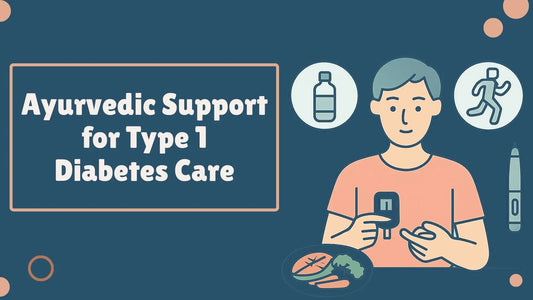
How Fasting Affects Diabetes: An Ayurvedic Perspective
Fasting is not just a spiritual or religious practice. When done right, it’s also a powerful metabolic reset that can help manage and even prevent diabetes.
With the rising number of prediabetic and diabetic individuals, especially in India, people are increasingly looking for natural ways to control their blood sugar.
Ayurveda, our ancient Indian system of medicine, offers valuable insights into how fasting can help restore balance and prevent diabetes from progressing.
In this blog, I will explain how fasting impacts diabetes from an Ayurvedic way and how you can adopt safe and effective fasting routines.
How Fasting Impacts Diabetes
From an Ayurvedic perspective, fasting is a method to ignite the Agni (digestive fire), eliminate Ama (toxins), balance Kapha, and promote overall metabolic health. Let’s explore how:
Reignites Agni (Digestive Fire)
In Ayurveda, Agni is considered the root of all metabolic activity. When Agni is weak, food isn’t digested properly, leading to the formation of Ama (toxins) and imbalances in blood sugar. Fasting gives Agni a break from constant work, allowing it to rebuild and function more efficiently.
A well-functioning Agni ensures proper digestion, nutrient absorption, and fat metabolism—all essential for preventing and managing diabetes. Regular short fasting can help restore this inner fire, making the body more resilient to metabolic disorders like Madhumeha (diabetes).
Eliminates Ama (Toxins)
Ama is the undigested waste that blocks bodily channels and is a major cause of chronic conditions, including diabetes. Fasting helps the body use stored energy, during which Ama is metabolized and removed, reducing internal inflammation.
By cleansing the digestive tract and tissues, fasting clears the path for better insulin activity and nutrient flow. Ayurveda recommends fasting with warm water or herbal decoctions to assist the body in flushing out toxins gently and naturally.
Balances Kapha Dosha
Type 2 diabetes is often associated with Kapha dosha imbalance—characterized by heaviness, lethargy, slow digestion, and weight gain. Fasting pacifies Kapha by lightening the body, reducing fluid retention, and improving digestive clarity.
As Kapha decreases, so does the tendency toward insulin resistance, belly fat, and low energy—all common in diabetics. Regular fasting helps restore doshic balance, which is key to Ayurvedic diabetes prevention and long-term management.
Improves Insulin Sensitivity
Modern research now validates what Ayurveda has long practiced—fasting improves insulin sensitivity and lowers blood glucose levels. When you fast, the body uses stored glucose, reduces insulin spikes, and enhances cellular insulin response.
Ayurvedic routines such as early dinners, long overnight gaps, and meal spacing align with circadian rhythms and reduce metabolic stress. These simple fasting patterns can lead to sustainable improvements in energy, weight control, and sugar metabolism.
Ayurvedic Fasting for Diabetes Management
Here are some safe and effective Ayurvedic fasting styles I recommend to my patients and readers:
1. Langhana Therapy (Lightning Therapy)
Langhana means “to make light” and is an Ayurvedic Langhana therapy approach to reduce heaviness and toxins in the body. It involves skipping meals or eating very lightly for 12–24 hours. This is especially beneficial for people with Kapha dominance, obesity, or early signs of diabetes.
By giving the digestive system a break, Langhana helps boost Agni (digestive fire) and eliminate Ama (toxins). It improves metabolism, supports fat loss, and naturally helps regulate blood sugar levels when practiced weekly under guidance.
2. Intermittent Fasting (IF) – The Ayurvedic Way
While not a classical Ayurvedic concept, Intermittent Fasting (IF) aligns with Ayurveda’s rule of not eating before the previous meal is digested.
Suggested routine:
-
14:10 or 16:8 fasting window
-
Early dinner by 7 PM
-
Breakfast after sunrise (around 9 AM)
This routine supports weight loss, improves insulin sensitivity, and balances Kapha dosha. Warm water, jeera tea, or tulsi decoctions can be consumed during fasting hours to maintain hydration and enhance digestion.
3. Weekly Fasting on Herbal Decoctions
Fasting one day a week using herbal decoctions like Triphala, Guduchi, Neem, or Methi water is a gentle detox method. These herbs support liver health, reduce blood sugar levels, and eliminate toxins from the body.
Avoid solid foods or keep them minimal (like moong dal soup or khichdi). This fasting approach purifies the system and improves glucose metabolism, but it should be avoided if you're on diabetes medication without a doctor’s advice.
Who Should Avoid Fasting?
While fasting is beneficial, but not for everyone, especially if you are on the following medications or conditions:
-
Are on insulin or sugar-lowering medication
-
Have Type 1 diabetes
-
Are pregnant or lactating
-
Have a history of eating disorders or low blood sugar episodes
My Advice as a Diabetes Specialist
Over my 5+ years of practice, I’ve seen fasting, when personalized and monitored, work wonders in reversing prediabetes, aiding weight loss, and lowering HbA1c levels. However, remember:
-
Fasting is not about starving, it’s about structured detoxification
-
Begin with mild fasting, like skipping dinner or having only fruits or khichdi once a week
-
Always break your fast with light, warm, easy-to-digest meals
Conclusion: Fasting is an Ayurvedic Reset Button
In Ayurveda, fasting is more than just not eating—it’s about aligning your eating rhythm with your body's natural clock to restore harmony.
Whether you are diabetic, prediabetic, or simply looking to stay healthy, understanding how fasting works from an Ayurvedic and medical point of view can empower you to make better lifestyle decisions.

Dr. Pooja Verma
Dr. Pooja Verma is a sincere General Ayurvedic Physician who holds a BAMS degree with an interest in healing people holistically. She makes tailor-made treatment plans for a patient based on the blend of Ayurveda and modern science. She specializes in the treatment of diabetes, joint pains, arthritis, piles, and age-related mobility issues.



